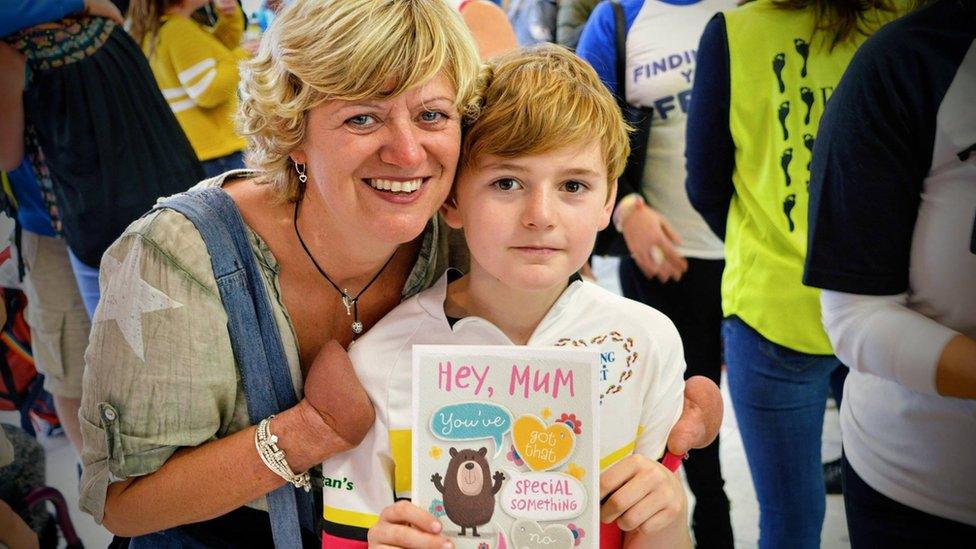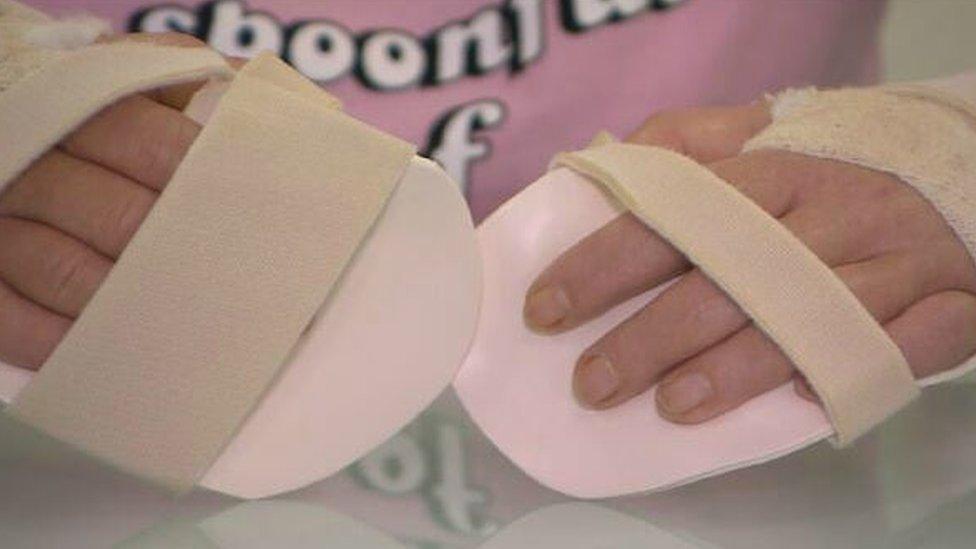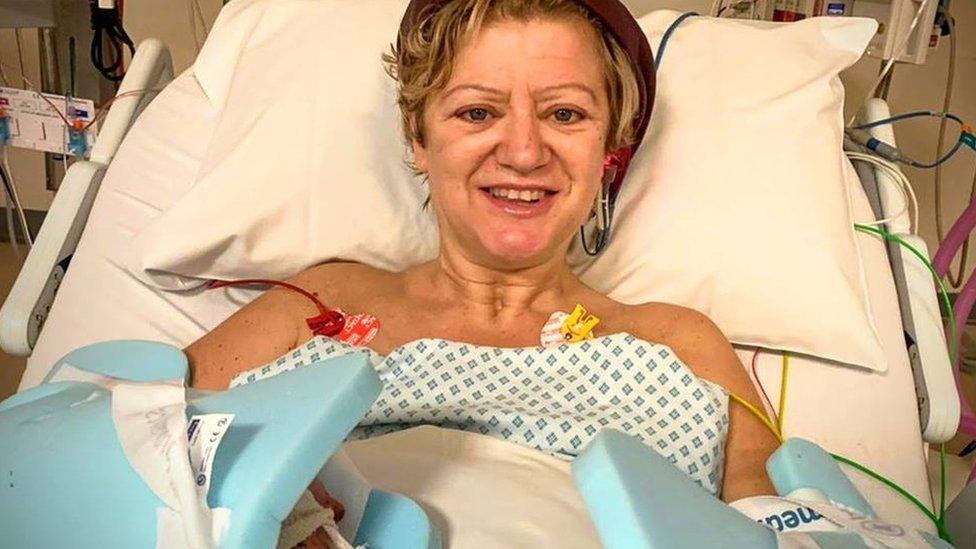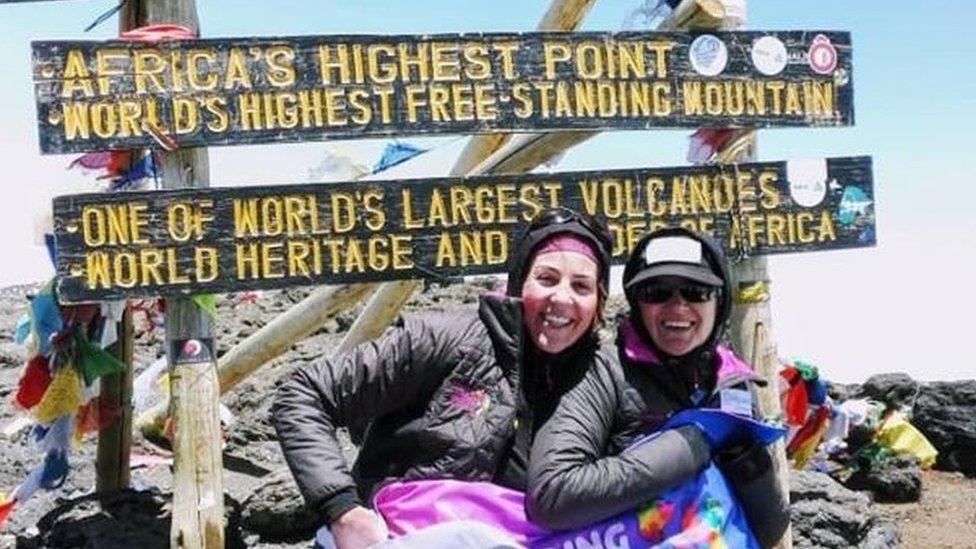Hand transplant mum's first wish is to hold son's hand
- Published
'I just want to hold my son’s hand'
Quadruple amputee Corinne Hutton has tackled triathlons and scaled Mount Kilimanjaro but a week on from life-changing surgery she has a simpler goal in mind.
After becoming the first Scot to receive a double hand transplant, the 47-year-old knows exactly what the first thing is that she will do with her new hands.
She told the BBC: "I want to hold my son's hand. That's the main thing. He always holds mine, so I want to to hold his."
Visibly emotional at the thought of holding son Rory's hand for the first time in five years, Corinne laughed: "At 10-years-old he might not be happy at that. But it's what I want to do."

Corinne Hutton and her son Rory
It has been just over a week since Prof Simon Kay led the team at Leeds General Infirmary that carried out the double hand transplant Corinne has been waiting for for five years.
The campaigner lost her hands and feet in 2013 after suffering acute pneumonia and sepsis, which nearly killed her.
After more than a dozen false alarms over the years, she learned in early January that a match for her own blood group, skin tone and hand size had been found.
But now that she is close to leaving hospital and bringing her new hands home to Lochwinnoch in Renfrewshire, she has revealed for the first time what it feels like to have hands again.
She said: "I thought I would have to convince myself that these were my hands.
"But instead I had to keep reminding myself of this gift and it's the other way round - they feel like my very own hands. From the very first day they did."
As she makes plans for a brighter future, at the forefront of her mind is the gift the donor family has given her.
Corinne did a lot of research into the donor process and spoke to families to prepare her for what was, hopefully, to come.
She said: "It's incredibly brave and a big, big decision for the family to make. I knew that all along and I spoke to families and I know what it means to them.
"I just hope they know that these hands have been given to somebody who will push them hard.
"I will take these hands all over the world and I will do the best things with them, I really will.
"They are life-changing for me and I am very very grateful."
And she said she cannot thank the donor family enough.
"A lot of people are living today because of that same donor. It's such a gift to be a donor. I hope it gives them a little bit of light in the traumatic times they are going through.
"I am so grateful and hopefully I can help the organ donation system and encourage people to sign up."

Corinne says the new hands feel like hers already
Corinne devotes her life to Finding Your Feet, the charity she founded to support amputees throughout the UK.
She became the first female quadruple amputee to reach the summit of Mount Kilimanjaro.
And she has climbed Ben Nevis, cycled around Arran, abseiled and she she has taken up skiing and ballroom dancing lessons.
Her new hands will give her a new lease of life to continue supporting other amputees.
She knows the immediate future will be hard but promises to make the most of her second chance.
She said: "I hope I do her proud - thank you - I promise I will.
"That's my job now - to make these hands work and do great things."

How did they do it?
Prof Simon Kay led the team on Corinne's transplant in Leeds.
He performed the first double hand transplant in the UK in 2016 and Corinne's surgery was his sixth.
He was awarded an OBE in the New Year Honours list.
He explained how the surgery went.

Miracle man: Prof Simon Kay was in charge of the procedure
"When the donor hands arrive, we had four operating tables.
"We worked from the point of the future join of the bone. Both hands and stumps were prepared in mirror image ways.
"When they come together the bone is fixed first, so that everything is stable and not floppy, then we fix the muscles, the tendons, the nerves, the veins, the arteries and then the skin."
Corinne's operation held two main challenges. She was difficult to find a match for and the team tried more than 20 times to match her to donors.
The second issue was making the decision to reduce Corinne's own arms. Surgeons and the patient had to make a decision whether to replace her wrists knowing if the transplant failed she would be left with a shorter arm.
But Prof Kay said: "It was challenging, but Corinne is a remarkable person and once she made the decision she never looked back."

- Published9 January 2019

- Published7 October 2018
